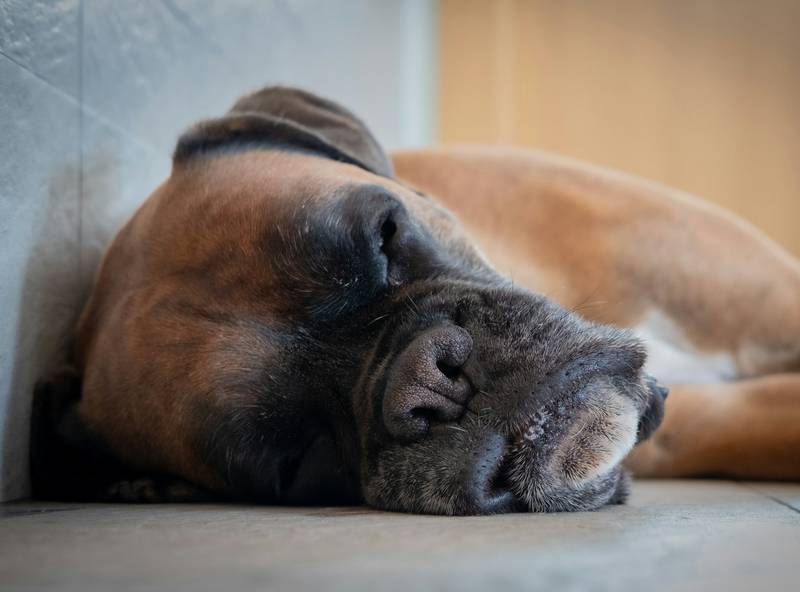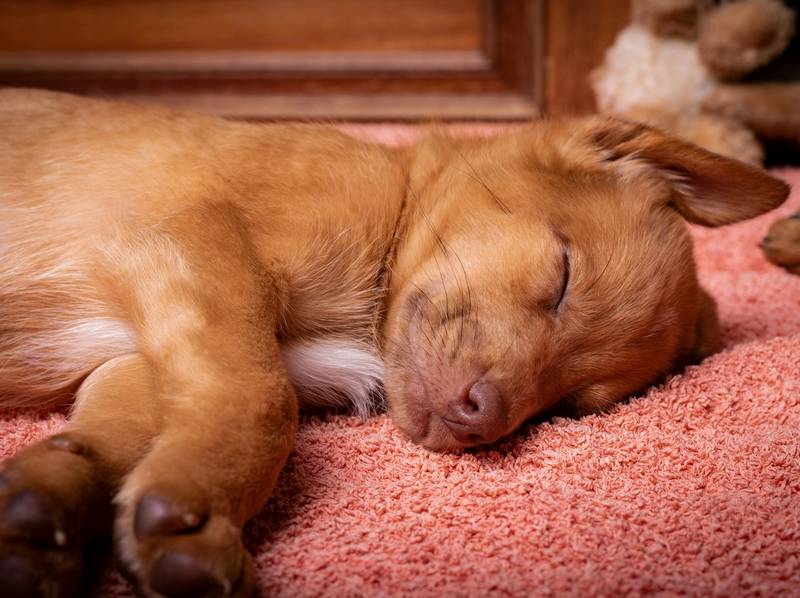Sleep Startle Reflex in Dogs: How to Stop Sleep Aggression in Dogs!
Need to know about the sleep startle reflex in dogs or how to stop sleep aggression in dogs? You’ve come to the right place! In this article, we’ll dive into what causes sleep aggression in dogs and (of course) teach you how to deal with the sleep startle reflex.
Additionally, we’ll explore whether you should wake your dog from a dream or nightmare and how to help them if they seem to be having a bad dream. Keep reading for advice on managing and understanding your dog’s sleep behaviors!
Sleep Startle Reflex in Dogs

The sleep startle reflex in dogs is a common phenomenon where a dog suddenly jerks awake from sleep, often appearing confused or aggressive. This reflex can be startling for both the dog and the owner, especially if the dog reacts with a snap or growl.
What Causes Dog Sleep Aggression?
Dog sleep aggression is caused by a natural defense mechanism known as the sleep startle reflex. This reflex is more pronounced in some dogs than others and can be triggered by unexpected touches or noises while the dog is sleeping.
Factors contributing to its intensity include the dog’s breed, past experiences, and even the sleeping environment. Dogs with a history of being in shelters or on the streets may exhibit a stronger reflex, as they’ve had to be more vigilant to survive.
Sleep Startle Reflex in Dogs Treatment
Addressing the sleep startle reflex in dogs involves creating a safe and comfortable sleeping area, minimizing disturbances, and training your dog to wake up more gently. It’s important to avoid touching or startling your dog while they are sleeping. Instead, use verbal cues to gently wake them up.
Providing a designated bed in a quiet, low-traffic area of your home can also help reduce the likelihood of sleep startle occurrences.
How to Stop Sleep Aggression in Dogs
To stop sleep aggression in dogs, you’ll need to combine these environmental adjustments with behavior modification techniques. Training your dog to associate waking up with positive experiences can be effective.
Start by speaking softly to your dog from a distance to gently rouse them, gradually decreasing the distance over time as your dog becomes more comfortable. Reward calm awakenings with treats and praise to reinforce positive behavior.
The sleep startle reflex is a natural response in dogs that can lead to sleep aggression but understanding and addressing the underlying causes can greatly improve the situation. By creating a safe sleeping environment, minimizing disturbances, and using gentle waking techniques, you can help your dog feel more secure and reduce the occurrence of startled awakenings.
It’s important to remember, however, that any underlying behavioral issues (anxiety, fear, aggression, etc.) that were causing all of this to begin with will still be present. And until you address those, any positive changes you see will only be temporary.
“Well, how do I make these changes last?”
By getting your dog to truly choose to follow your direction, that’s how. I tried many times to write out how you can do that before deciding it made more sense to just link you to the free video series that explains it better than I’d ever be able to.
The series is by a man named Dan who is one of the world’s leading dog obedience trainers. In it, he teaches you how to put an end to things like your dog getting aggressive after being woken up and all other misbehavior using his fast and easy-to-follow methods.
In the first video, Dan will reveal to you why the two most common methods of dog training only doom you to failure. You can watch the video now by clicking here. Follow the proven system he’ll show you in his series and you’ll never have to spend another second worrying about your dog’s sleep aggression ever again!
Should I Wake My Dog Up From a Dream?

Deciding whether to wake your dog from a dream can be a dilemma. Observing your dog twitching, whining, or paddling their feet during sleep might make you wonder if they’re having a bad dream and need comfort.
Generally, it’s recommended to let dogs sleep through their dreams, as this is a normal part of their sleep cycle. However, understanding more about dogs’ sleep patterns and how to respond to nightmares can help you make the best decision for your furry friend.
Do Dogs Have Nightmares?
Yes, dogs can have nightmares. Like humans, dogs experience REM (Rapid Eye Movement) sleep, the stage where dreaming occurs. While we can’t know for sure what they’re dreaming about, the signs of distress or fear during sleep suggest that dogs can have dreams that are not pleasant.
These nightmares could be influenced by their daily experiences, memories, or even traumas. Learn the steps to wake up your dog gently by going back to the first section now.
Should You Wake up a Dog Having a Nightmare?
Waking a dog from a nightmare is not generally advised. Doing so can startle them, leading to confusion or even an aggressive reaction if they wake up disoriented. It’s important to remember that dogs process their experiences through dreams, and interrupting this can be more disruptive than the distress caused by the nightmare itself.
How to Help Dog Having Nightmare
If your dog seems to be having a nightmare, the best approach is to provide comfort without waking them. You can speak softly to your dog, offering calming words that can soothe them even as they sleep.
Creating a comfortable and secure sleeping environment can also help reduce the frequency and intensity of nightmares. If your dog frequently seems distressed during sleep, it may be worth discussing their behavior with a vet to ensure there are no underlying health or anxiety issues.
In summary, while it can be concerning to watch your dog appear distressed during a dream, waking them is usually not the best approach. Understanding that dreaming, including having nightmares, is a natural part of your dog’s sleep cycle can help you respond in a way that supports their well-being.
Providing a safe, comfortable environment and consulting with a veterinarian for persistent issues are effective ways to help your dog have a more peaceful rest.
I’m sure you’re ready to begin now that you have all of your questions about your dog’s sleep aggression answered, so I’ll let you get started on things. Best wishes, and thank you for taking a look at our article “Sleep Startle Reflex in Dogs: How to Stop Sleep Aggression in Dogs!”.





